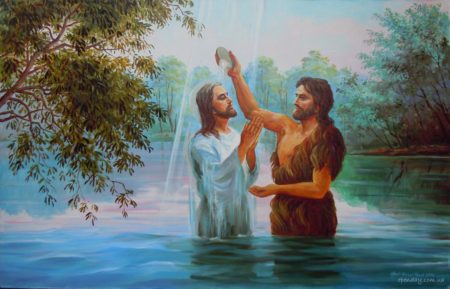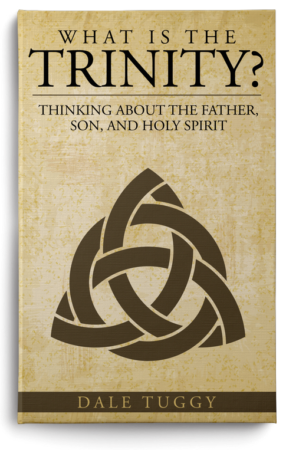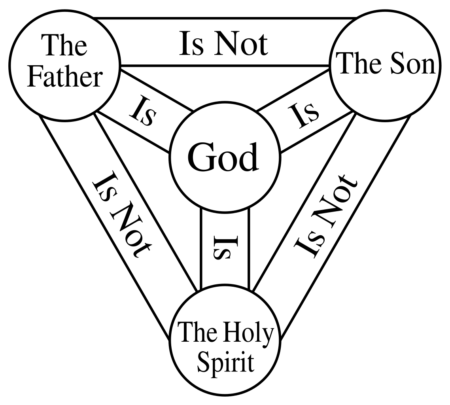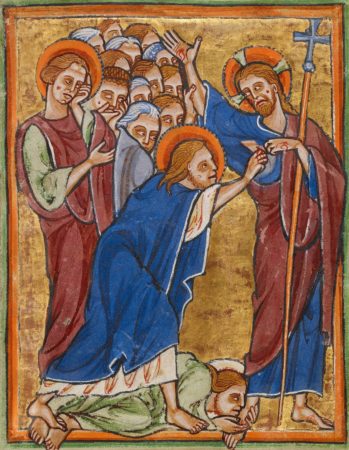Well, it must be admitted that some do! But the intention of trinitarian Christian traditions is to worship only one God, one God “in” three “Persons.”
Continuing from last time, here is the rest of British evangelical author Adrian Warnock’s post, which part he calls “Do Christians worship three Gods?” which is meant as a sort of primer on “the Trinity,” with my comments.
The Christian God is three in one: God the Father, God the Son, and God the Holy Spirit. Christians explain this by the concept of the Trinity: God has always existed as three persons, but one God, and we worship them all.
Our author holds that there should be three recipients of Christian worship – Father, Son, and Spirit – but did he mean to say four? Wouldn’t the Trinity, the triune God also be an object or worship?
Further, here is some interesting homework: in the New Testament, how many objects of worship to there appear to be, and which of the aforementioned Four are these objects?
 Perhaps one of the clearest demonstrations of their personhood was at Jesus’ baptism, when they each had distinct roles. The Son was the one getting wet, the Father spoke from heaven, and the Spirit appeared in the form of a dove (Luke 3:21-22).
Perhaps one of the clearest demonstrations of their personhood was at Jesus’ baptism, when they each had distinct roles. The Son was the one getting wet, the Father spoke from heaven, and the Spirit appeared in the form of a dove (Luke 3:21-22).
Alas, the spirit/Spirit coming down like a dove – this falls far short of a depiction as a self, a person, an intelligent agent. For all that’s written here, a movie director might portray this is a bird-sized light coming down and sort of resting on Jesus. So this passage is not at all a clear “demonstration” of the personhood of each of the three, despite our author’s assertion.
The Bible tells us that “God is love” by His very nature (1 John 4:16). This was true even when only the Trinity existed, and there was no one else to love.
God has eternally been a community of three people, and so we should never foolishly imagine that He was lonely before the universe was created.
From eternity past the members of the Trinity have loved and indwelt each other. Jesus said, “The Father is in me and I am in the Father” (John 10:38).
This idea of God as a perfect community – this is not really a part of historical trinitarian traditions, but is a recent idea, as is the idea that a unipersonal god would be lonely or otherwise somehow deficient before creation. These ideas are simply not in the Bible. And note that John 10:38 doesn’t say what the author needs it to say.
In the Bible, the one God is a “he,” (namely, the Father) never an “it” or a “they.” How does this fit with God being “a perfect community”?

There are several illustrations commonly used to describe God. While these are all helpful to some extent, they all have weaknesses which help us realize what God is not like.
The Trinity is often compared to water, which can exist in three forms: liquid, steam, and ice. However, God is not sometimes the Father, sometimes the Son, and sometimes the Holy Spirit. He is all three all at once.
Here the author says, rightly, that the Persons of the Trinity are not supposed to exist serially, one after the other. That is what catholic traditions say. But notice that this illustration is for a one-self Trinity theory – God is a single “He,” who just exists in three ways.
But think about it. Can the Father really be a “way God exists” (a mode), and the Son another such way? These two speak to one another, love one another, cooperate together. Can two modes, two ways God exists, do such things? Does the NT present just one being who is “friends” with… himself? (That is, in one mode he is friends with himself in another mode?)
 Another illustration that is used is a man who may be simultaneously a husband, a father, and a son. However, the man is only one person, who functions in different ways. In contrast, God comprises three persons, rather than three manifestations of the same person.
Another illustration that is used is a man who may be simultaneously a husband, a father, and a son. However, the man is only one person, who functions in different ways. In contrast, God comprises three persons, rather than three manifestations of the same person.
So… the Trinity are three beings? A person is a thinking, willing, knowing, acting being. In the man example here, there is one person. But now, contrary to what was said just above, we’re told that in the Trinity, there are three persons, not one. Which is it? One self in the Trinity, or three? I discuss these options, by the way, in my What is the Trinity?.
Ultimately, God is incomparable and all we can finally do is worship Him. The three persons of the Trinity are distinct from each other, yet together they make up one God.

This truth has been expressed for centuries in a diagram we include on this page. This is a profound mystery. Yet it is a simple truth.
Here, the common mystery bailout. Is this a reasonable act of humility, or just a theoretical failure spun as nothing to worry about? The author senses some looming inconsistency here, hence the bailout.
 But what he says is understandable: “The three persons of the Trinity are distinct from each other, yet together they make up one God” – “make up” – this is just to suggest that the “Persons” of the Trinity are parts of the Trinity. As parts are beings, not mere modes, this would fit the three-self idea above. Now the creeds don’t say that the Persons are parts of the Trintiy, but what is wrong with this?
But what he says is understandable: “The three persons of the Trinity are distinct from each other, yet together they make up one God” – “make up” – this is just to suggest that the “Persons” of the Trinity are parts of the Trinity. As parts are beings, not mere modes, this would fit the three-self idea above. Now the creeds don’t say that the Persons are parts of the Trintiy, but what is wrong with this?
Calling Jesus “Lord” also declares that He is in charge of you and that you will live for Him. Many today do not want to surrender the control of their lives to anyone, let alone to Jesus.
The Bible is clear: you cannot be a Christian and carry on living for yourself. If Jesus is your Lord, you must obey Him and give Him your total allegiance.
How you choose to respond to Jesus is the most important decision you will ever make. Some say, “He was a great teacher, the best the world has ever seen.” Even secular historians recognize that Jesus was the most influential man in all of history.
Here we’re back to the Jesus is awesome theme from part 1, which I agree with.
Others go further saying, “He was a great prophet.” But Jesus claimed to be God, accepted worship, and proclaimed that He would rise from the dead.
This is a big subject, but on the face of it, Jesus did not claim to be God. Rather, he claimed to be God’s unique Son, which is to say, God’s human “Messiah.” Notice that this is the clear thesis statement of all four gospels; this is the main point you are to get from those four books, not the idea that Jesus is God. We know that Jesus is not God himself for many reasons, including that Jesus died, and that Jesus put his faith in God.
Good teachers don’t claim they are the only way to God; instead, they point to their teachings. What He said was either true, or else He was foolish, or a liar. Jesus, it is often said, was either bad, mad, or God.
The first sentence is false, according to the NT. Jesus was a good teacher, in fact the best. And he did teach that he’s in some sense the only way to God. Paul later summarizes as, there’s one God (the Father) and there’s one man who is the unique mediator between God and us. (1 Timothy 2:5) About the last part – again, Jesus prayed to God, obeyed God, taught us about God, served as the best human representation of God, gave himself up as a sin sacrifice to God – but he didn’t claim to be God himself. Rather, our God is also his God, according to him. (John 20:17) God doesn’t have a god over him, but the Lord Jesus does. (Ephesians 1:3, Ephesians 1:17)
If you are not yet a Christian, recognizing Jesus as God and choosing to worship and follow Him as your Lord is the crucial turning point.
Declaring Jesus to be your Lord and meaning it requires the help of the Holy Spirit (1 Corinthians 12:3). It is crucial that you admit to Jesus that you have sinned, and ask Him to forgive you, and help you to follow Him from now on.
How do we worship Jesus?
We d0 have to use our mouths to offer worship. When Jesus performed a miracle and walked on water, the gospel tells us,
“those in the boat worshiped him, saying, “Truly you are the Son of God.” (Matthew 14:33).
Don’t give in to confusing Jesus for his and our God. Be like the people in the boat. Honor Jesus as God’s unique Son.
Unlike angels who refused to accept worship, Jesus didn’t try and stop them.
It was proper for them to “worship” Jesus on that occasion (although arguably the Greek word should be translated as “bowed to”).
 Jesus also accepts worship from Thomas, as the doubter becomes the true believer and declares the divinity of Jesus:
Jesus also accepts worship from Thomas, as the doubter becomes the true believer and declares the divinity of Jesus:
Then he said to Thomas, “Put your finger here, and see my hands; and put out your hand, and place it in my side. Do not disbelieve, but believe.” Thomas answered him, “My Lord and my God!” Jesus said to him, “Have you believed because you have seen me? Blessed are those who have not seen and yet have believed” (John 20:27-29).
The text doesn’t call this “worship,” although certainly here Thomas is honoring the risen Lord. But it is important to see that Thomas confesses and honors two here: his Lord (Jesus) and his God (the Father). This is the pattern of confession in the New Testament: one God (Yahweh) and also one Lord (Jesus). (1 Corinthians 8:4-6) (Somewhat confusingly, two are called “Lord” in the NT – the Lord God and the Lord Jesus Christ. More here.)
Worship is not just about singing songs, although that is clearly a part of it. It is much more about who we serve. We worship our master, who determines and directs our lives.
If you worship Money, it means you serve it and allow its dictates to determine all your decisions. If you worship God, you make him your Lord and follow him in every aspect of your life.
To worship also means to honour, it is all about respect, and again Jesus demands the same honour from us as we are to give to his Father:
For the Father judges no one, but has given all judgment to the Son, that all may honor the Son, just as they honor the Father. Whoever does not honor the Son does not honor the Father who sent him. (John 5:22-23)
In the NT, certainly both the exalted Jesus and (his and our) God are worshiped. But compare the reasons cited by the worshipers for worshiping God in Revelation 4 with those cited for worshiping Jesus in Revelation 5. These worshipers seem clear about the fact that they are worshiping two, for different reasons.
At the heart of Christianity lies the belief that Jesus is God, and following His triumphant resurrection, He is the ruler of the universe who will one day return to earth to reign as King.
Really, a disciple of Jesus ought to follow his and his apostles’ theology, on which the Father is the one true God. (John 17:1-3) We must study our way past the confused tradition of saying that “Jesus is God,” meaning that God just is Jesus and Jesus just is God. For others, this slogan “Jesus is God” is just a reference to traditional theories about Jesus “having a divine nature” in addition to “a human nature.” That’s another topic for another day. (More here.)
 Worship is not a one-way street. As we gather to worship Jesus, or worship him on our own he promises to meet with us. And it is this meeting with God that will draw our hearts to honor him more, and then to live for him. Obeying Jesus comes from abiding with him, and loving him.
Worship is not a one-way street. As we gather to worship Jesus, or worship him on our own he promises to meet with us. And it is this meeting with God that will draw our hearts to honor him more, and then to live for him. Obeying Jesus comes from abiding with him, and loving him.
Note the swapping of the names “Jesus” and “God” here, as if they were co-referring terms. It’s just confused, though. God sent his only Son. Jesus never sent his only Son. Jesus died on the cross. God didn’t die on the cross, as he is by his essence immortal.
It seems appropriate to end this article with the opening words of John’s Gospel which describes Jesus as the Word:
In the beginning was the Word, and the Word was with God, and the Word was God. He was in the beginning with God. All things were made through him, and without him was not any thing made that was made. In him was life, and the life was the light of men. The light shines in the darkness, and the darkness has not overcome it. . . The true light, which gives light to everyone, was coming into the world. He was in the world, and the world was made through him, yet the world did not know him. He came to his own, and his own people did not receive him. But to all who did receive him, who believed in his name, he gave the right to become children of God, who were born, not of blood nor of the will of the flesh nor of the will of man, but of God.
And the Word became flesh and dwelt among us, and we have seen his glory, glory as of the only Son from the Father, full of grace and truth. . . No one has ever seen God; the only God, who is at the Father’s side, he has made him known. (John 1:1-17)
This much disputed passage deserves a long discussion. But notice that Jesus clearly comes in only in v. 14, the second to last sentence quoted. In this man, God’s “Word” lived among us. What is this “Word” by which God made all things? It “was God.” (v. 1) So was it the same god as mentioned before (start of v. 1) or is it a different god, a second god? Trinitarian traditions, oddly, assume the latter; they then add that really, this second “god” is a “Person” within God. But John doesn’t say that. Why can’t he be personifying God’s “Word” here, so it is “with” God during creation, as God’s Wisdom was said to be (Proverbs 8:30)? There are many connections here with the OT and with intertestamental literature, but again, this deserves a full discussion. I’ll end by noting that there were ancient disputes about this text c. 150-380, when the Logos theorists started to assert their theology of a second, lesser god, the Logos (in addition the Father Almighty, the one God of Israel). Their opposition, called “monarchians,” insisted that the Logos (“Word”) here is not a being, but a property or action of God, which is expressed in the man Jesus, so that the divine reality in Jesus is just the empowering of God, the God who gave him his doctrine and who did mighty works through this man.
 If you’re got this far in this post, you have seen that our author has not given us a handy primer on the Trinity, but has instead opened many cans of worms, while admitting that his view doesn’t make sense.
If you’re got this far in this post, you have seen that our author has not given us a handy primer on the Trinity, but has instead opened many cans of worms, while admitting that his view doesn’t make sense.
My advice is to go back to the sources; examine the NT with fresh eyes, and don’t only listen to trinitarian commenters.
Who is the one true God the NT, the Father only, or all three of them together?
Why are only two, Father and Son, worshiped there, but never the Trinity or the Holy Spirit?
Is the Holy Spirit clearly presented as a self? Or is it often presented as something like a force or a power?
